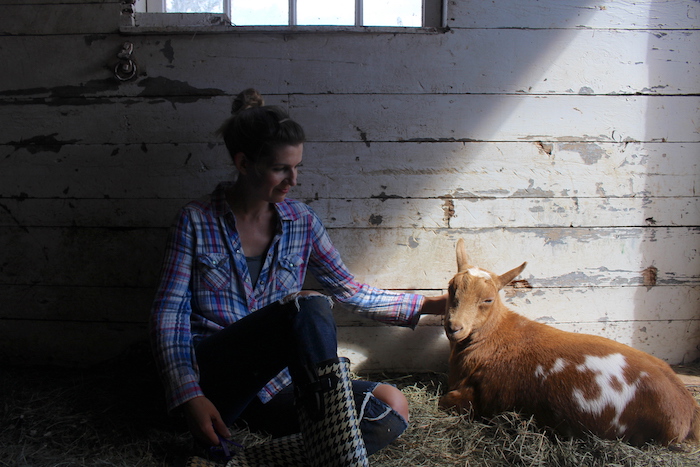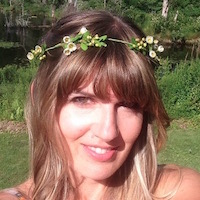
Eleditor’s note: Elephant is a diverse community of sixteen million readers and hundreds of writers (you can write too!). We are reader-created. Many blogs here are experience, opinion, and not fact or The One Right Point of View. We welcome all points of view, especially when offered with more sources and less invective, more frankness and less PR. Dislike this Op-Ed or opinion? Share your own take here.
Kathy Parker’s article Dear Vegan, There’s Something I Have to Say, garnered a lot of attention and discussion here on Elephant Journal.
It’s framed as a heartfelt plea for mutual respect to those she feels has insulted her—vegans.
But a closer looks shows a “straw man” argument that generalizes an entire group. It doesn’t address the central point of the diverse vegan movement: The great harm we do to animals to commodify them is unnecessary and we can make other choices.
Wait! Have I lost you? Please read that again. Non-vegans—my friends, family or strangers—I have not insulted you or said anything mean or untrue. It’s uncomfortable for me, too. But I’ve only stated a simple truth that I, too, was socially conditioned for most of my life to avoid discussing and see as a personal attack.
The world’s largest organization of food and nutrition professionals, the Academy of Nutrition and Dietetics, declared years ago that vegan diets are healthful and appropriate for humanity, and we have animal-free options for fashion, entertainment, and otherwise.
So why do most of us continue to intentionally and avoidably violate other sentient individuals, or pay for others to do it?
Again, for those with access and autonomy, doing so is a choice.
It’s hard to answer this. Really hard. When we instead just complain about how some vegans were rude, we absolve ourselves of responsibility for this choice while simultaneously looking for validation.
No, unfortunately not everyone communicates kindly or effectively. But we can all agree that doing unnecessary harm to others is wrong. We either hold ourselves accountable for such harm, or we don’t. There’s no discourse, compromise, or dialogue needed to dilute and confuse this point. There’s no need to “shoot the messengers,” even if their words figuratively cut deep.
Aren’t physical acts of violence against the defenseless far worse than any verbal objections to them?
When we betray the vulnerable for reasons that are undeniably selfish, we instinctively want to silence the moral minority pointing this out.
Stereotyping, mischaracterizing and further marginalizing vegans helps accomplish this.
Let’s face it. The violence of animal agriculture, even under the best of conditions, flies right off our collective radar because we’re brought up to avoid acknowledging it. It’s as invisible and unspoken as it is omnipresent. Using animals is seen as an entitlement. We legally violate and fatally harm them depending on what kind of fur, feathers, or fins they were born with. We squander resources to grow large piles of plants to reduce them into smaller piles of flesh, secretions and skin (with a side of pollution)—while millions starve and the planet suffers along with our collective health.
With many historic entitlements of the dominant culture, it’s only seen in hindsight how cruel and unnecessary they were. As vegans—most previously complicit ourselves, including yours truly!—we’re saying today this is needless and wasteful, and it’s time to move on.
But it comes at an emotional price beyond feeling powerless to stop the slaughter. It’s been documented in a published Harvard research paper that people are often mocked when it’s simply discovered they are vegetarian. As such, those who are clear and assertive in their vegan advocacy are frequently ostracized. This runs the gamut from accusations of moral superiority to “cult member” or “Nazi.”
Yet without exceptions noted, Parker writes that vegans do the following and more:
• Spout condemnation, judgment, and hate
• Taint the world with bigotry, intolerance, narrow-mindedness
• Divide communities with anger and hostility
Meanwhile, many tolerant and accomplished individuals including MLK Jr’s late wife Coretta Scott King and his oldest son Dexter Scott King, US Senator Corey Booker and Congressman Ted Deutch and even Stevie Wonder are vegan, because veganism is a social justice movement for people, planet and animals.
Rather than speaking out about it, should they instead keep the peace in the name of conformity and destruction? Because people might feel judged?
In a comment, Parker says she and her husband give their farmed animals “the best life possible.” The caveat, of course, is that she’s only referring to what’s possible within the context of farming them for food—in which even the best life possible involves being violated in a myriad of ways and is almost always cut tragically short. Now, that bloody hurts.
Literally.
Is that really all that’s possible? Is that good enough, let alone better or best, for anyone? Of course not. At vegan farm sanctuaries (many run by former animal farmers), the animals live out their days without being bred, used or slaughtered.
But because the vegan movement challenges our acquired tastes, habits and traditions, it tends to hit a wall of cognitive dissonance. And that feels deeply uncomfortable.
Vegans cause that feeling, not our own harmful actions.
Right?
“Right!” Answers the dominant culture. “Have a free-range chicken wing, and tell those vegans to stop attacking us!”
Author: Lorelei Plotczyk
Image: Author’s own
Editor: Renée Picard






Read 49 comments and reply